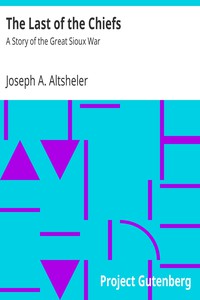The Scouts of the Valley by Joseph A. Altsheler (snow like ashes series .TXT) 📗

- Author: Joseph A. Altsheler
Book online «The Scouts of the Valley by Joseph A. Altsheler (snow like ashes series .TXT) 📗». Author Joseph A. Altsheler
Carpenter looked incredulous.
“It is true,” said Henry, “every word of it.”
“It is more than Brant would have done,” said Carpenter, “and it saves us, with your help.”
“You were first, and the first credit is yours, Mr. Carpenter,” said Henry sincerely.
They did not tell the women and children of the fight at the oasis, but they spread the news that there would be no more pursuit, and many drooping spirits revived. They spent another day in the Great Dismal Swamp, where more lives were lost. On the day after their emergence from the marsh, Henry and his comrades killed two deer, which furnished greatly needed food, and on the day after that, excepting those who had died by the way, they reached Fort Penn, where they were received into shelter and safety.
The night before the fugitives reached Fort Penn, the Iroquois began the celebration of the Thanksgiving Dance for their great victory and the many scalps taken at Wyoming. They could not recall another time when they had secured so many of these hideous trophies, and they were drunk with the joy of victory. Many of the Tories, some in their own clothes, and some painted and dressed like Indians, took part in it.
According to their ancient and honored custom they held a grand council to prepare for it. All the leading chiefs were present, Sangerachte, Hiokatoo, and the others. Braxton Wyatt, Blackstaffe, and other white men were admitted. After their deliberations a great fire was built in the center of the camp, the squaws who had followed the army feeding it with brushwood until it leaped and roared and formed a great red pyramid. Then the chiefs sat down in a solemn circle at some distance, and waited.
Presently the sound of a loud chant was heard, and from the farthest point of the camp emerged a long line of warriors, hundreds and hundreds of them, all painted in red and black with horrible designs. They were naked except the breechcloth and moccasins, and everyone waved aloft a tomahawk as he sang.
Still singing and brandishing the tomahawks, which gleamed in the red light, the long procession entered the open space, and danced and wheeled about the great fire, the flames casting a lurid light upon faces hideous with paint or the intoxication of triumph. The glare of their black eyes was like those of Eastern eaters of hasheesh or opium, and they bounded to and fro as if their muscles were springs of steel. They sang:
We have met the Bostonians [*] in battle, We slew them with our rifles and tomahawks. Few there are who escaped our warriors. Ever-victorious is the League of the Ho-de-no-sau-nee. [* Note: All the Americans were often called Bostonians by the Indians as late as the Revolutionary War.] Mighty has been our taking of scalps, They will fill all the lodges of the Iroquois. We have burned the houses of the Bostonians. Ever-victorious is the League of the Ho-de-no-sau-nee. The wolf will prowl in their corn-fields, The grass will grow where their blood has soaked; Their bones will lie for the buzzard to pick. Ever-victorious is the League of the Ho-de-no-sau-nee. We came upon them by river and forest; As we smote Wyoming we will smite the others, We will drive the Bostonians back to the sea. Ever-victorious is the League of the Ho-de-no-sau-nee.The monotonous chant with the refrain, “Ever-victorious is the League of the Ho-de-no-sau-nee,” went on for many verses. Meanwhile the old squaws never ceased to feed the bonfire, and the flames roared, casting a deeper and more vivid light over the distorted faces of the dancers and those of the chiefs, who sat gravely beyond.
Higher and higher leaped the warriors. They seemed unconscious of fatigue, and the glare in their eyes became that of maniacs. Their whole souls were possessed by the orgy. Beads of sweat, not of exhaustion, but of emotional excitement, appeared upon their faces and naked bodies, and the red and black paint streaked together horribly.
For a long time this went on, and then the warriors ceased suddenly to sing, although they continued their dance. A moment later a cry which thrilled every nerve came from a far point in the dark background. It was the scalp yell, the most terrible of all Indian cries, long, high-pitched, and quavering, having in it something of the barking howl of the wolf and the fiendish shriek of a murderous maniac. The warriors instantly took it up, and gave it back in a gigantic chorus.
A ghastly figure bounded into the circle of the firelight. It was that of a woman, middle-aged, tall and powerful, naked to the waist, her body covered with red and black paint, her long black hair hanging in a loose cloud down her back. She held a fresh scalp, taken from a white head, aloft in either band. It was Catharine Montour, and it was she who had first emitted the scalp yell. After her came more warriors, all bearing scalps. The scalp yell was supposed to be uttered for every scalp taken, and, as they had taken more than three hundred, it did not cease for hours, penetrating every part of the forest. All the time Catharine Montour led the dance. None bounded higher than she. None grimaced more horribly.
While they danced, six men, with their hands tied behind them and black caps on their heads, were brought forth and paraded around amid hoots and yells and brandishing of tomahawks in their faces. They were the surviving prisoners, and the black caps meant that they were to be killed and scalped on the morrow. Stupefied by all through which they had gone, they were scarcely conscious now.
Midnight came. The Iroquois still danced and sang, and the calm stars looked down upon the savage and awful scene. Now the dancers began to weary. Many dropped unconscious, and the others danced about them where they lay. After a while all ceased. Then the chiefs brought forth a white dog, which Hiokatoo killed and threw on the embers of the fire. When it was thoroughly roasted, the chiefs cut it in pieces and ate it. Thus closed the Festival of Thanksgiving for the victory of Wyoming.
CHAPTER XIII. A FOREST PAGE
When the survivors of the band of Wyoming fugitives that the five had helped were behind the walls of Fort Penn, securing the food and rest they needed so greatly, Henry Ware and his comrades felt themselves relieved of a great responsibility. They were also aware how much they owed to Timmendiquas, because few of the Indians and renegades would have been so forbearing. Thayendanegea seemed to them inferior to the great Wyandot. Often when Brant could prevent the torture of the prisoners and the slaughter of women and children, he did not do it. The five could never forget these things in after life, when Brant was glorified as a great warrior and leader. Their minds always turned to Timmendiquas as the highest and finest of Indian types.
While they were at Fort Penn two other parties came, in a fearful state of exhaustion, and also having paid the usual toll of death on the way. Other groups reached the Moravian towns, where they were received with all kindness by the German settlers. The five were able to give some help to several of these parties, but the beautiful Wyoming Valley lay utterly in





Comments (0)